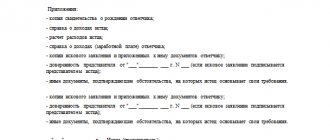More and more often you can come across the complaint: “The father filed for alimony for his daughter/son. What should I do? Many lawyers and experts face similar questions. Is this requirement legal? What to do if parents file for child support? Can they even do that? The answers to these questions will be presented to your attention below. With proper preparation for a dispute, many problems can be avoided.
Alimony is...
First, you need to understand what alimony is. In Russia, this is what they call payments for the maintenance of certain disabled citizens. Usually the payers and recipients of money are relatives.
Most often we are talking about child support. These are funds that are paid for the maintenance, treatment and care of a minor child. But there are other payments.
In Russia, there is alimony for the maintenance of parents. In other words, parents are obliged to support disabled children, and grown children - needy parents. It is this scenario that causes many problems.
Required package of documents
The plaintiff must attach the following package of documents to the claim:
- ID card of father or mother - plaintiff’s passport;
- a certificate indicating the date and place of birth of the adult son or daughter - the defendant;
- certificate of receipt of pension;
- MSEC statement on assigning a disability group to the plaintiff;
- a certificate of the amount of the pension or disability payment received by the plaintiff;
- book about the labor activity of a citizen of the Russian Federation (labor);
- calculations of expenses and salary amounts;
- photocopies of the claim and a specific package of documents - depending on how many parties are participants in the court hearing.
Conditions for payments
Did the father file for child support? Theoretically, he has the right to do so. As already mentioned, by law, adult able-bodied children are required to financially support needy parents. But you will have to take into account several features. Not always legal representatives have the right to financial support.
Child support can be demanded under the following circumstances:
- the parent is a pensioner;
- the citizen has a disability of 1 or 2 groups.
Accordingly, able-bodied parents are not entitled to funding from their children.
Legal aspect
According to Article 87 of the Family Code, able-bodied children who have reached the age of majority are obliged to support their parents.
Parents to whom the following concepts apply are entitled to receive financial support:
- incapacity for work resulting from reaching retirement age or disability;
- need for help, that is, the inability to ensure one’s existence on one’s own.
If there is no agreement on the payment of alimony, parents have the right to seek financial support through the court. The amount of alimony that will be determined depends on the financial and marital status of the parties, as well as other important circumstances.
In addition, the amount of alimony is determined in a fixed amount, and the court must take into account all the parent’s adult and able-bodied children.
Current legislation provides for exemption from the obligation to help a parent if he does not have parental rights.
Reasons
Did the father file for child support? We will have to take into account a few more nuances in which payments will be assigned. The point is that it is not always possible to demand financial support from children. Even disability and retirement age do not in all cases allow you to receive alimony from your children.
In addition to the conditions listed, there are a number of reasons for which financial support is awarded to parents. Namely:
- children have reached adulthood (or been emancipated);
- adults are recognized as able to work;
- there is confirmation of family ties;
- parents are in extreme need and at the same time cannot work themselves.
Only if all these features are observed, children will have to pay 100% child support to their parents. But in reality, everything is not as simple as it seems. Often, relatives meet in court precisely because of alimony disputes.
What if the father didn't pay child support?
A glaring injustice: a father demands money from his children if he himself did not pay it in due time. In this case, the court can actually exempt the child from payments to the parent. But this is not the rule. This is rather an exception. The court will consider the details of the case and take into account all the nuances: for example, did the father simply not pay child support or did he actually evade payments? In the first case, the parent will still receive child support. And in the second - it’s unlikely.
There is only one situation in which children can definitely not pay child support: if their father is deprived of parental rights. In fact, now the “father” is not a parent, and therefore has no right to demand anything from children who are no longer his own.
How can I pay?
Can a father file for child support for his daughter? Yes. And for my son too. The mother can also file for child support. This is the legal right of parents. But, as we have already found out, it can only be realized under certain circumstances.
There are different ways to pay child support. For example, by personal agreement or by alimony agreement drawn up by a notary. Also, alimony for parents can be awarded by court. This arrangement occurs most often in practice.
However, if you have a good relationship with your children, you don’t have to worry about your old age. They themselves will help to the best of their ability. But if the relationship is not very good, then you will have to seek justice through the courts. Should children be afraid of anything?
How to collect them from the mother/wife?
The father will have to arrange child support in one of two ways:
- Concluding a voluntary agreement with your ex-wife. If she agrees to pay alimony in the required amount and order, then the two of them can contact a notary to draw up and notarize the agreement. This agreement has the same legal force as a writ of execution. And this will help avoid evasion of payments on the part of the mother.
- If an agreement cannot be reached, then the father needs to go to court. If you win in court, the corresponding decision to collect alimony is sent to the bailiff service. They will be responsible for collecting child support from the mother. However, the mother, in turn, has the opportunity to appeal the court's decision.
The claim can be considered by two courts:
- World Court. He considers simple cases involving the collection of alimony. If other family aspects do not appear in the case, then you need to apply here.
- District Court . If there are other questions, for example, about the place of residence of the children, then the case goes to the district court. You should also contact us here if, in addition to collecting alimony, there is a need to establish paternity.
On a note. The plaintiff can go to court both at the place of his own residence and at the place of residence of the defendant.
When filing a claim, you will need to collect the following documents:
- Copies of passports of the plaintiff and defendant.
- Copies of children's birth certificates and marriage/divorce certificates.
- Certificate of family composition. It can be obtained from the housing maintenance company at the place of registration. If the mother lives separately, the certificate must also be obtained at her place of residence, and you may have to draw up a corresponding application for this. If there is no information about the defendant's address, a petition must be filed to establish the place of his current residence.
- Calculation of the amount of alimony with justification. The amount of child support must be supported by evidence of expenses for the child - checks, receipts, receipts, etc.
In addition to the documents, it is necessary to prepare the statement of claim itself. In accordance with the requirements specified in Article 131 of the Code of Civil Procedure of the Russian Federation, the application must indicate the following:
- Name of the court.
- Full name of each party and their address details.
- The very requirement to collect alimony and the rationale for its legality.
- Evidence in the case.
- Required amount of alimony.
- List of attached documents.
We previously talked about how such a statement of claim is drawn up if the mother demands alimony from the father to support herself and the child.
In the future, child support can be deducted directly from the mother’s salary - her employer will automatically transfer it to the recipient’s account. If there is no or insufficient income, alimony can be collected directly from the mother’s bank account, as well as her property.
Financial situation of children
Yes. If a parent applies for child support, then, subject to all the listed conditions and grounds, they will have to give part of their income to their former legal representatives. And it doesn’t matter at all what the actual relationship is between parents and children. Even if there is intra-family feud, money will have to be paid for good reasons.
At the same time, the court will not worry about the financial situation of the children. This means that the difficult financial condition of the younger generation will not free them from alimony for their parents. The court will still force you to make certain payments. Yes, the financial condition of the family will be taken into account, but not as the main indicator for awarding alimony.
Applying for a son/daughter
When collecting child support from their adult and able-bodied child, a parent will have to go to court. The first step in this case will be to draw up a statement of claim and collect the required documents.
The statement of claim is drawn up indicating the following information:
- Name of the court.
- Full name and contact information of the plaintiff and defendant.
- Description of the circumstances. The status of the parent is indicated (reaching retirement age or disability), his need is justified with the calculation of income/expenses, and evidence of the lack of financial assistance from the adult child is also indicated.
- Calculation of the amount of alimony.
- A formulated demand for the collection of child support from an adult child.
- List of attached documents.
- Date of compilation and signature.
The following documents must be attached:
- Copies of the plaintiff's passport and the defendant's birth certificate.
- Pension certificate or disability certificate.
- Certificate of the amount of disability benefits or pension received.
- Employment history.
- Calculations of income and expenses.
A claim is filed in the magistrate's court. It is filed either at the place of residence of the plaintiff or at the place of registration of the defendant - your choice. The claim can be filed either personally by the plaintiff or by his representative with the appropriate power of attorney. You can also send everything using registered mail, with a written inventory of all contents.
If the court's decision is positive, the plaintiff will be issued a writ of execution, which will need to be sent to the bailiff service. They, in turn, will begin to collect alimony from the defendant.
Several children
“My dad filed for child support against me. What do i do?" - such complaints are found in real judicial practice more and more often. And the applicants are indeed, in most cases, fathers. They are the ones who must pay alimony when divorcing their spouse.
What if parents have several children? This fact will be taken into account by the court. It is impossible to free one child from supporting parents and transfer this responsibility fully to another.
What does it mean? If a father has filed for child support for his daughter, but he still has able-bodied adult children, then the daughter can prove this to the court and relieve herself of part of the financial responsibility for supporting the father. You can refuse the help of a particular child, but to your own detriment. The court, as already mentioned, will equally distribute child support obligations between the children.
The procedure for collecting funds from older children
Expert opinion
Kuzmin Ivan Timofeevich
Legal consultant with 6 years of experience. Specializes in the field of civil law. Member of the Bar Association.
In what cases can a father receive child support? You can receive alimony transfers from an adult son or daughter when the magistrate’s court has made a similar decision.
Therefore, the first correct step should be to file a claim with a judicial institution. The claim must include the following information:
- the name of the court to which the claim is filed;
- personal information about the plaintiff - full name, place of registration, day, month and year of birth, marital status, telephone contacts;
- information about the defendant - full name, place of registration, day, month and year of birth, where he works, marital status, telephone contacts;
- Title of the document;
- information about specific circumstances - the status of one of the parents (retired or disabled), the neediness of mom or dad (cost calculations and salary), information about the lack of financial assistance from older and working children;
- information about the absence of a settlement agreement on alimony payments;
- legality of claims (reference to laws);
- calculation of the amount for financial support of the father or mother;
- claim requirements - recovery of a specific amount from mature children in favor of 1 of the parents;
- list of documents provided to the court;
- signature of one of the parents;
- date of filing the claim.
Parents and their responsibilities
“My dad wants to sue me for alimony,” is a complaint that can be found more and more often in Russia. You don't always have to worry about such threats. The thing is that alimony for parents is awarded taking into account many conditions. And not only those that have already been presented to your attention earlier.
In addition to them, the plaintiff parent will have to prove to the court that he has fulfilled parental obligations throughout his life. That is, he supported, raised, taught, treated and protected his child. Otherwise, he will not be able to demand child support. This nuance must be taken into account and proven.
Did the father file for child support? Have you ever paid for the upkeep, upbringing, and education of a child? Then the daughter has nothing to fear. She will have to prove the fact of her father’s evasion from paying child support, after which the judicial authorities will recognize such a parent as unworthy. And even his difficult financial situation and disability cannot be the basis for assigning financial support from children.
Also, parents who have been deprived of their rights cannot apply for alimony. In practice, such people only threaten children with court-ordered alimony so that they voluntarily agree to provide for their ancestors. But according to the law, deprivation of parental rights is a serious operation that relieves biological parents of responsibility for the upbringing and maintenance of minor children. And their right to alimony is also taken away.
Case practice
The court considered a case in which a citizen demanded to collect alimony in the amount of 4.5 thousand rubles from two children - a son and a daughter. from everyone. The claims were partially satisfied , the amount of material payments for each defendant was reduced to 2 thousand rubles, the total amount of monthly alimony was 4 thousand rubles.
Considering the case materials, the court found that the plaintiff receives several types of pension from the state: for the loss of a breadwinner and for disability. In addition, the state will compensate her for part of the payments for housing and communal services, as well as the purchase of necessary medicines.
Both defendants bear additional financial burdens: the son pays child support after a divorce, and the daughter is a single mother. In addition, they already pay alimony to the father of 1.5 thousand rubles. each on the basis of a contract.
General information about judicial practice on child support to parents is described in this article.
Is small alimony a reason to panic?
Did the father file for child support? A child may be forced to finance an incapacitated needy parent if that parent was performing their parental functions.
In modern practice, quite often there are situations in which parents pay child support, but in meager amounts. Fathers lower their salaries in every way so as not to spend money on their underage offspring. Nevertheless, they pay alimony, albeit in very small, sometimes ridiculous amounts.
Under such circumstances, the child may face serious problems in the future. In this case, the father has the right to alimony. Moreover, in a decent amount, and not in the form of symbolic payments.
Child support is collected when the parents are in need, disabled and provided that they, to one degree or another, provided care and maintenance for minor children. Paying alimony means supporting, feeding, raising and training. This is exactly what the court will consider. And it doesn’t matter that these payments could be about 1,500 rubles per month. The main thing is that child support was still paid.
Order and procedure
The applicant in the case of collection of alimony can be either the disabled parent in need or his official representative:
- Any capable person - on the basis of a power of attorney issued by the parent.
- Guardian or trustee - if the father/mother was deprived or limited in legal capacity.
After this comes the most important stage, which consists in collecting documents and drawing up an application (since the case of collecting alimony in a fixed amount is considered in the manner of litigation, it must also be a lawsuit).
When all the necessary papers have been collected, they must be sent to the magistrate along with the claim. This can be done in person, by mail or with the help of a trusted person.
Further, the process will largely depend on the judge - based on the materials received, he makes a decision on whether to accept the claim, the start of legal proceedings and the date of the hearing.
Expert opinion
Kuzmin Ivan Timofeevich
Legal consultant with 6 years of experience. Specializes in the field of civil law. Member of the Bar Association.
In court, the plaintiff (applicant's side) and the defendant (potential alimony payer or his representative) once again clarify their positions on the dispute under consideration, and witnesses are interviewed. And then, based on the information received, the judge forms his decision.
The act issued by him dictates the amount and procedure for collecting alimony or rejects the applicant’s demands.
Punishment for evasion
If a father has filed for alimony for his daughter or son, and the child evades his obligations, then the descendants may be held accountable in one way or another. What is the punishment for evading parental support?
Among them are:
- arrest - up to 3 months;
- forced labor - up to a year;
- imprisonment - 12 months.
All these punishments are imposed only in case of malicious evasion of alimony. Judicial authorities must repeatedly warn the child about the need to provide financial support to the parents.
FOR FREE
- Due to frequent changes in legislation, information sometimes becomes outdated faster than we can update it on the website.
- All cases are very individual and depend on many factors. Basic information does not guarantee a solution to your specific problems.
That's why FREE expert consultants work for you around the clock!
- via the form (below), or via online chat
- Call the hotline:
Fulfillment by parents of the responsibilities of maintaining and raising their children is the key to society acquiring a worthy and law-abiding person in the future.
Current Russian legislation also provides for the reverse obligation of adult children to provide for their elderly parents if such a need arises after retirement or due to illness.
Alas, not every adult son agrees to voluntarily pay child support to his parents. An elderly mother and father, ignoring the needs of their son, are forced through the courts to defend their right to help from their adult offspring.
conclusions
Parental support is not usually paid. In families with good relationships, children usually voluntarily help their ancestors. But there are exceptions.
Disabled, needy parent filing for child support? If he fulfilled his obligations towards his children with dignity, then he is entitled to appropriate support in old age. Otherwise, it will not be possible to demand money from children.
In general, each situation is an individual matter. And it is impossible to say exactly when child support will be collected and when it will not. The main thing is that the Family Code provides for financial support for both parents and children. Only a disabled parent can count on a positive court decision.
✨ Summary
To sum it up:
- A parent can file a claim for child support against their adult able-bodied child.
- When making a decision, the court will focus on the plaintiff’s situation (physical, financial), as well as the composition of the defendant’s family and his income.
- The most important fact is whether the parent himself paid child support at one time. If it turns out that he did not participate in any way in the life of the child, then the collection of alimony will be denied.
- To prove the non-participation of a parent in the maintenance of a child, testimony or documentary evidence (writs of execution, etc.) will be needed.
Amount of alimony in case of voluntary agreement
All rules and regulations for drawing up an agreement are prescribed in Chapter. 16 of the Family Code.
The advantage of this method is that both parties can agree on the amount of financial assistance themselves.
There are no maximum or minimum restrictions here.
Acceptable types of alimony payments:
- a share of one or all of the alimony worker’s earnings;
- fixed amount of money;
- can be paid in a lump sum, monthly or according to another convenient scheme;
- cash payment can be replaced by the provision of property;
- other options are possible.
The contract must include the issue of indexation of payments. If this point is not taken into account, then the increase in financial assistance will depend on the increase in the cost of living.
Collection of alimony through court
If the parties were unable to reach an agreement and conclude an agreement, you can exercise your right to receive financial support for a decent life in court by filing an application for alimony.
Where to contact
Such categories of cases are considered by a magistrate. Documents can be submitted to the magistrate at both the residence address of the plaintiff and the defendant. The application must be submitted to the court in person or can be sent by mail.
The following must be specified:
- Justice of the Peace, number, address of the precinct.
- FULL NAME. the plaintiff, his address, you can also indicate a telephone number.
- FULL NAME. defendants, their addresses, telephone numbers.
- The amount that the plaintiff wants to receive as alimony monthly, with calculation and justification. You cannot specify an arbitrary amount; you must justify every ruble of funds collected, for example, how much is needed for medicines, a nurse, massage, etc.
- Cost of claims (to calculate it, you need to multiply the amount of alimony per month by twelve, that is, per year).
- Description of the financial and marital status of the defendants (where they work, how much they earn, how many dependents they have, etc.).
- References to legal norms (Article 87 of the Family Code of the Russian Federation).
- Demand to collect alimony.
- Date, signature.
We invite you to read: Assignment of the right to lease a land plot in 2021
You will need the following documents:
- a copy of the children's birth document;
- certificates of the plaintiff’s income (pensions, benefits, etc.);
- confirmation that the plaintiff does not work (copy of the work book);
- a copy of the disability document;
- medical documents;
- documents confirming the need to incur regular expenses (for example, for a nurse, massage therapist, etc.);
- power of attorney for a representative, if he is involved;
- a copy of the claim and all documents according to the number of defendants;
When considering this category of cases, the applicant is exempt from paying state fees. The state fee will be collected from the losing party.
Additional payments for parental support
In addition to monthly maintenance, the parent has the right to involve his son in bearing additional expenses associated with his care.
For example, in situations where a parent is seriously ill and is unable to care for himself on his own, or he requires personal medical assistance (or rehabilitation) on a paid basis. In this case, it is allowed to collect additional amounts of monetary support from the parent, in addition to the fixed amount of alimony every month.
The amount of such expenses can be determined by agreement of the parties, or by the court, taking into account significant nuances, in particular the family and financial situation of the defendants.
Medical certificates, extracts from the medical history, and a parent’s rehabilitation plan will be required as supporting documents.
Exemption from alimony
If there are the following grounds, adult children may be exempt from paying alimony:
- They are completely exempt from the obligation to provide financial assistance to their parents if the latter were legally deprived of parental rights. If such rights are subsequently restored by a court decision, no exemption from payment occurs (Article 71 of the Family Code of the Russian Federation).
- The court, taking into account the specific circumstances of the case, may exempt from alimony if the parents evade parental responsibilities in relation to the child against whom the claim is now brought. The defendant must prove the fact that the parent evaded his upbringing or maintenance. As a rule, witness testimony is taken into account. If alimony was collected from the mother or father, the payment of which they evaded, then the proof will be a certificate from the bailiffs about the existing arrears of alimony.
- If a parent committed a deliberate crime against his child or abused alcohol, drugs, or abused the child in childhood, the court has the right to relieve him of the obligation to provide financial assistance to the parents. Judicial practice is based on specific crimes or actions committed by the plaintiff.
Voluntary assistance
Law in art. 87 of the Family Code of the Russian Federation provides for the right of parents applying for financial assistance, and children obliged to provide such assistance, to enter into an agreement among themselves, which will provide for all the nuances of the payment of funds transferred for maintenance. It must be certified by a notary.
The agreement is signed both between both parents and all children, and separately with each of them. You can specify what specific amount each payer will transfer.
If the payer of the money subsequently refuses to pay, makes a delay or pays less, the father and (or) mother will be able to contact the bailiffs with such an agreement in order to collect the funds forcibly. In this case, enforcement proceedings will be initiated, and money will be withheld from the salary.
We invite you to read: How to pay child support for an unemployed person
It is, of course, possible to do without concluding such an agreement with notarization; the parties can verbally agree on everything, or enter into a written agreement without a notary and fulfill their obligations. This is not prohibited by law. However, in this case, parents will be deprived, if the payers violate their obligations, of the opportunity to recover money through bailiffs, without going to court.
Therefore, when children agree to pay voluntarily, it is better not to waste money on a notary, having drawn up all agreements as prescribed by law, so as not to later file an application for alimony in court and not to waste even more time and money on litigation.







